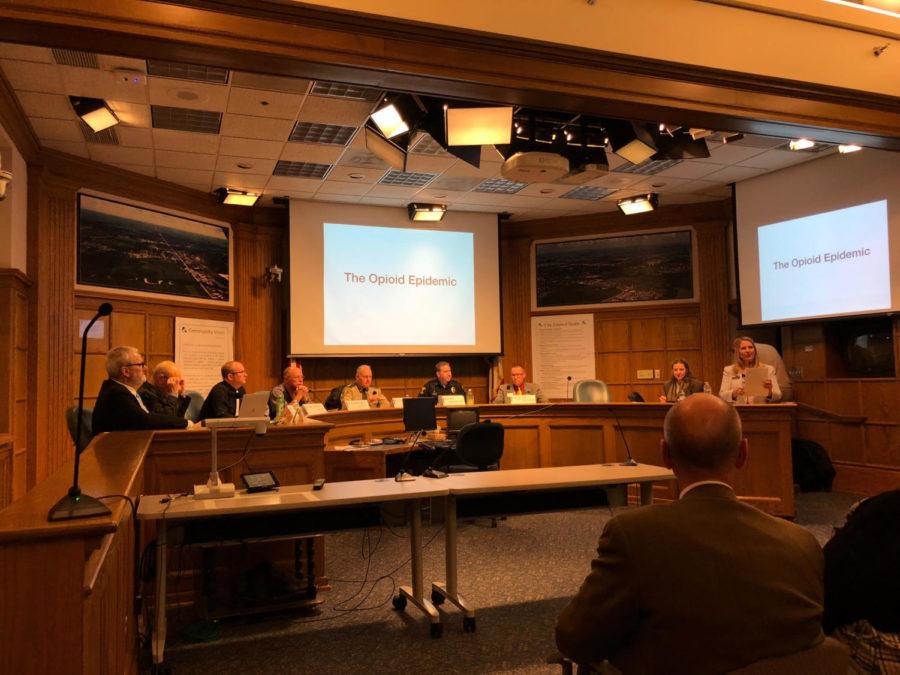- App Content
- App Content / News
- News
- News / Politics And Administration
- News / Politics And Administration / Campus
- News / Politics And Administration / City
- News / Politics And Administration / State
Opioid town hall: ‘Stop fueling the fire’
January 10, 2018
The message expressed during a town hall hosted by the Story County Opioid Task Force was simple: “Anybody could become addicted to opioids and everybody has been exposed to them.”
In an effort to curtail a rising opioid epidemic in central Iowa, officials such as law enforcement, medical professionals and drug addiction stakeholders gathered Wednesday evening to answer questions from the public regarding the issue.
While the meeting, which lasted nearly two hours, focused largely on the potential of an opioid epidemic in the area, highlighted a proactive effort officials are taking in recognizing the need to preemptively address it.
“What we have with opioids… is that this epidemic curve continues to be propagated,” said Peter Komendowski with Partnership for a Drug Free Iowa during a brief presentation in advance of the question and answer session. “But today, we need to look at this problem as one we can manage in our community.”
An upward of 100 people attended the town hall with the City Council chambers having to be expanded into the court chambers minutes before the 7 p.m. predicted start time for more seating.
Panelists of the town hall included: Komendowski, Dale Woolery, associate director of the Office of Drug Control Policy; Scott Sitzman with PharmD, Alan Bollinger with Primary Health; Mark Rowe-Barth, director of Student Wellness at Iowa State; Cmdr. Geoff Huff with Ames Police and Sheriff Paul Fitzgerald with Story County.
Issues of opioid addiction and opioid related deaths have grown in Iowa in recent years, something the panelists were attributing to have traveled from the east and west.
“If this opioid epidemic is like a forest fire, these are resources that are putting the fire out,” Komendowski said, adding the need for communities to “stop fueling the fire.”
In Iowa, opioid overdose deaths have grown from 50 in 2007 to 91 in 2017, according to the Iowa Department of Public Health.
With this increase, and fear of a growing epidemic, the panel touted several measures different stakeholders can take to curb the issue, including:
- Working to get opioids off the street
- Using Naloxone, an opioid overdose reversal drug
- Seizing unused and oftentimes abused prescribed drugs when they are no longer needed by the patient and
- Enrolling Iowans into a prescription monitoring program.
“The availability of these things are out there,” Huff said. “They are in medicine cabinets all over the place.”
This concern of availability was predominant throughout the conversation, with Bollinger emphasizing the importance of patient-doctor relations in medicine.
“Personally, this is multifactorial…when you look at the rules that we live under, I can get in trouble for under-treatment of pain, I can get in trouble for over-treatment of pain…either way I lose, the patient may lose,” he said. “Pain is not the problem, it’s the symptom.”
As for questions gauged to the panel, they covered issues such as prevention and treatment to measurable ways to handle chronic pain and insurance issues.
Story County Supervisor Lauris Olson asked: “What can we do more than what we’re already doing? What can we do as local policymakers to help?”
For Sitzman, his plea was for more educational resources in the community and a primary care provider in the city of Ames.
“We do need more primary care providers… It is a shame of Ames, Iowa that we have one person once a week. My patients have to go to Des Moines and Mason City, Iowa to get this treatment,” he said.
The meeting concluded with an audience member asking everyone for a show of hands if they knew someone going through drug addiction.
Nearly half the room raised their hands.
















